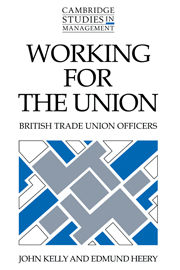Book contents
- Frontmatter
- Contents
- List of figures and tables
- Preface
- List of abbreviations
- Part 1 Introduction
- 1 Introduction: trade unions and industrial relations
- 2 Theoretical analyses and empirical studies of trade union officers
- Part 2 The parameters of union work
- Part 3 The full-time officer at work
- Part 4 Conclusions
- Appendix: Research methods
- Notes
- Bibliography
- Index of names
- Index of subjects
- Cambridge Studies in Management
2 - Theoretical analyses and empirical studies of trade union officers
Published online by Cambridge University Press: 22 October 2009
- Frontmatter
- Contents
- List of figures and tables
- Preface
- List of abbreviations
- Part 1 Introduction
- 1 Introduction: trade unions and industrial relations
- 2 Theoretical analyses and empirical studies of trade union officers
- Part 2 The parameters of union work
- Part 3 The full-time officer at work
- Part 4 Conclusions
- Appendix: Research methods
- Notes
- Bibliography
- Index of names
- Index of subjects
- Cambridge Studies in Management
Summary
Chapter 1 explained why an analysis of the role, behaviour and values of full-time officers is integral to many of the debates about contemporary British industrial relations. In the present chapter we therefore set out to look at the theoretical and empirical literature on union officers with three aims in mind. First, we want to outline and evaluate the major theoretical approaches that have been used to understand trade union organization, and the role of the officer within the union. Secondly, we want to summarize the current state of knowledge about union full-time officers in Britain, though from time to time we shall also refer to comparative material. Finally, we shall outline the main features of our own approach to the explanation of union officer organization and behaviour.
Some of the most contentious issues in the study of trade union organization were first highlighted by the Webbs in their classic studies Industrial Democracy (1902) and The History of Trade Unionism (1920). The local craft societies of the early nineteenth century became transformed into large, national organizations, and with the change in size came a change in structure. The ‘primitive democracy’ of mass membership meetings gave way to the delegate conference, the elected executive committee and the full-time salaried officer with an increasingly sophisticated division of labour between them. This separation of functions between rank and file members, delegate conference, executive committee and full-time officers led the Webbs to raise two critical questions about trade union organization. What were the relations of power between these different groups within a trade union?
- Type
- Chapter
- Information
- Working for the UnionBritish Trade Union Officers, pp. 8 - 30Publisher: Cambridge University PressPrint publication year: 1994



